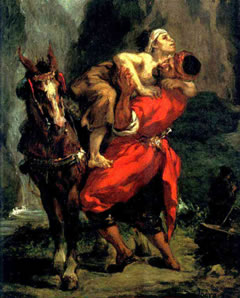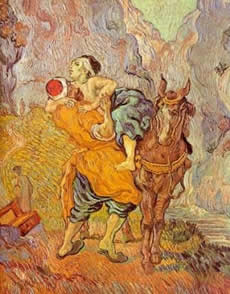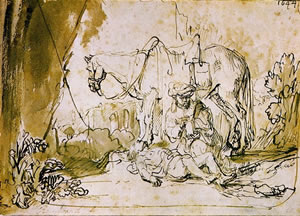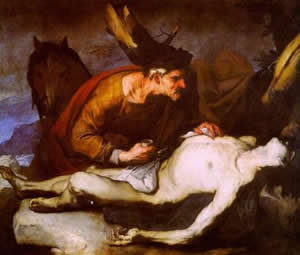
|
Humanizing Holiness:
Are Some Commandments More Important Than Others?
For Sunday October 26, 2008
Lectionary Readings (Revised Common Lectionary, Year A)
Deuteronomy 34:1–12 or Leviticus 19:1–2, 15–18
Psalm 90:1–6, 13–17 or Psalm 1
1 Thessalonians 2:1–8
Matthew 22:34–46
 |
The Good Samaritan by Delacroix. |
About a year ago, my daughter called me from high school to say that she needed a ride home: "Someone stole my bike." Much to our surprise, this petty case went to trial, and the thief was found guilty. The defense attorney tried to blame my daughter for not locking her bike, but that only incensed the judge. At the end of the trial, she spoke to my daughter: "I don't want you to ever think that in any way this was your fault. A person should not have to worry about having their bike stolen just because they left it unlocked."
Imagine a high school where people didn't steal bikes or, in the case of my son, graphing calculators. Think of a Wall Street where investment bankers didn't create complex financial instruments that skimmed billions of dollars and wrecked the economy. A community like that would be what the Bible calls "holy." They would be places where people were "whole" and wholesome, and treated each other like they wanted to be treated.
A "holy" person or place stands in sharp contrast to what Leviticus calls the "unclean," "detestable" or "perverted" behavior by which we "defile" ourselves and others. The language of Leviticus is vividly suggestive; would you rather live, work, and play in a place that is "clean" or "dirty," "pure" or "impure?" To be "holy" means that in some limited but genuine way we reflect the character of God himself.
 |
The Good Samaritan by Van Gogh. |
"You shall be holy," says Leviticus 19:2, "because I, the Lord your God, am holy." For the ancient Jews, this exhortation to holiness was codified in complex purity laws. The famous Ten Commandments were only the beginning. By one count there are 613 mizvot or "commandments" in the five books of Moses (the Torah). The purity laws of Leviticus chapters 11–26 encompass nearly every aspect of being human—birth, death, sex, gender, health, economics, agriculture, jurisprudence, social relations, hygiene, marriage, behavior, and even ethnicity (Gentiles were automatically considered impure).
The "holiness code" in Leviticus specifies in minute detail clean and unclean foods, purity rituals after childbirth or a menstrual cycle, regulations for skin infections and contaminated clothing or furniture, prohibitions against contact with a human corpse or dead animal, instructions about nocturnal emissions, laws regarding bodily discharges, guidelines about planting seeds and mating animals, keeping the sabbath, forsaking idols, tattoos, and extensive decrees about sex. Leviticus 18 codifies about twenty types of (un)lawful sexual relations.
Some of these ancient commands seem self-evident. We gladly follow them today and neglect them at our peril. Honor your parents. Take special care of the poor, the blind, the deaf, and the alien. Don't steal or lie. Don't have sex with your parent, your child, or an animal. Don't cheat your employee or your customers.
But side by side with these timeless truths are other commands that are lost to a different time and place, and we feel no compunction in ignoring them today — don't mate different kinds of animals, plant your field with two kinds of seeds, cut the hair at the sides of your head, or wear garments made of two kinds of materials. Similarly, we rightly ignore some of the punishments for breaking these "laws," like the death penalty for cursing your parents or adultery.
 |
The Good Samaritan by Rembrandt. |
Scholars debate how much or how little ordinary first-century Jews concerned themselves with maintaining "ritual purity" by obeying the holiness code in Leviticus, but the Pharisees about whom we read so much in the Gospels certainly did. And so in the gospel for this week a Pharisee who is described as an "expert" in the law "tested Jesus with this question: 'Teacher, which is the greatest commandment in the Law?'" (Matthew 22:36).
Maybe this was a trick question designed to trap Jesus. If he privileged a single commandment, didn't that mean he neglected others? How dare he imply that we can wink at some of God's laws! Or if he suggested that all the commandments were equally weighty, didn't that contradict common sense? Surely a tattoo (Leviticus 19:28) isn't as morally weighty as child sacrifice (Leviticus 18:21)! Or maybe the expert was posing an honest inquiry: "Lord, so many commands! How should we understand them all? Are some more important than others?"
Buried deep in that holiness code was one, single command, Leviticus 19:18, that Jesus said was more important than the 611 other commands. Jesus responded that the most important commandment is this: "'Hear, O Israel, the Lord our God, the Lord is one. Love the Lord your God with all your heart and with all your soul and with all your mind and with all your strength' [Deuteronomy 6:4]. The second is this: 'Love your neighbor as yourself' [Leviticus 19:18]. There is no commandment greater than these." The questioner liked Jesus's answer and affirmed that these two commands were "more important than all burnt offerings and sacrifices."
With that deft response Jesus linked our love of God with our love of neighbor. You cannot separate the two. To have one is to have the other, and to neglect one is to lose them both.
 |
The Good Samaritan by Luca Giordano. |
The necessary connection between claiming to love God and demonstrating that we love our fellow human beings became so embedded in the early Christian traditions that all three Gospels contain a version of this story (Matthew 22:34–46 = Mark 12:28–31 = Luke 10:27). The command to love our neighbor is repeated almost verbatim by Paul (Romans 13:8–9, Galatians 5:14), by James (James 2:8), and most memorably by John: "If anyone says, 'I love God,' yet hates his brother, he is a liar. For anyone who does not love his brother, whom he has seen, cannot love God, whom he has not seen. And he has given us this command: Whoever loves God must also love his brother" (1 John 4:20–21).
A generation after the first believers, the theologian Justin Martyr (c. 100–165) summarized the appeal of a "holy" Christian community: “Those who once delighted in fornication now embrace chastity alone. . . we who once took most pleasure in accumulating wealth and property now share with everyone in need; we who hated and killed one another and would not associate with men of different tribes because of their different customs now, since the coming of Christ, live familiarly with them and pray for our enemies.” Similarly, Tertullian (AD 155–220), who wrote, "Our care for the derelict and our active love have become our distinctive sign before the enemy. . . See, they say, how they love one another and how ready they are to die for each other."
And so, said Jesus, "all the Law and the Prophets hang on these two commandments" (Matthew 22:40).
For further reflection:
* Romans 13:8–9: "Let no debt remain outstanding, except the continuing debt to love one another, for he who loves his fellow man has fulfilled the law."
* Galatians 5:14: "The entire law is summed up in a single command: 'Love your neighbor as yourself.'"
* Galatians 5:6: "The only thing that counts is faith expressing itself through love."
* James 2:8: "If you really keep the royal law found in Scripture, "Love your neighbor as yourself,' you are doing right."
* 1 Corinthians 13:2: "Without love I am nothing."
Image credits: (1) http://chungpa.or.kr/; (2) OneYearBibleImages.com; (3) Art and the Bible; and (4) Jesus Explained.





